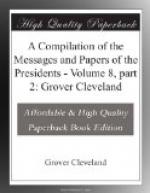Since the close of the last Congress certain Cubans and other foreigners resident in the United States, who were more or less concerned in the previous invasion of Cuba, instead of being discouraged by its failure have again abused the hospitality of this country by making it the scene of the equipment of another military expedition against that possession of Her Catholic Majesty, in which they were countenanced, aided, and joined by citizens of the United States. On receiving intelligence that such designs were entertained, I lost no time in issuing such instructions to the proper officers of the United States as seemed to be called for by the occasion. By the proclamation a copy of which is herewith submitted I also warned those who might be in danger of being inveigled into this scheme of its unlawful character and of the penalties which they would incur. For some time there was reason to hope that these measures had sufficed to prevent any such attempt. This hope, however, proved to be delusive. Very early in the morning of the 3d of August a steamer called the Pampero departed from New Orleans for Cuba, having on board upward of 400 armed men with evident intentions to make war upon the authorities of the island. This expedition was set on foot in palpable violation of the laws of the United States. Its leader was a Spaniard, and several of the chief officers and some others engaged in it were foreigners. The persons composing it, however, were mostly citizens of the United States.
Before the expedition set out, and probably before it was organized, a slight insurrectionary movement, which appears to have been soon suppressed, had taken place in the eastern quarter of Cuba. The importance of this movement was, unfortunately, so much exaggerated in the accounts of it published in this country that these adventurers seem to have been led to believe that the Creole population of the island not only desired to throw off the authority of the mother country, but had resolved upon that step and had begun a well-concerted enterprise for effecting it. The persons engaged in the expedition were generally young and ill informed. The steamer in which they embarked left New Orleans Stealthily and without a clearance. After touching at Key West, she proceeded to the coast of Cuba, and on the night between the 11th and 12th of August landed the persons on board at Playtas, within about 20 leagues of Havana.
The main body of them proceeded to and took possession of an inland village 6 leagues distant, leaving others to follow in charge of the baggage as soon as the means of transportation could be obtained. The latter, having taken up their line of march to connect themselves with the main body, and having proceeded about 4 leagues into the country, were attacked on the morning of the 13th by a body of Spanish troops, and a bloody conflict ensued, after which they retreated to the place of disembarkation, where about 50 of them obtained boats and reembarked therein. They were, however, intercepted among the keys near the shore by a Spanish steamer cruising on the coast, captured and carried to Havana, and after being examined before a military court were sentenced to be publicly executed, and the sentence was carried into effect on the 16th of August.




